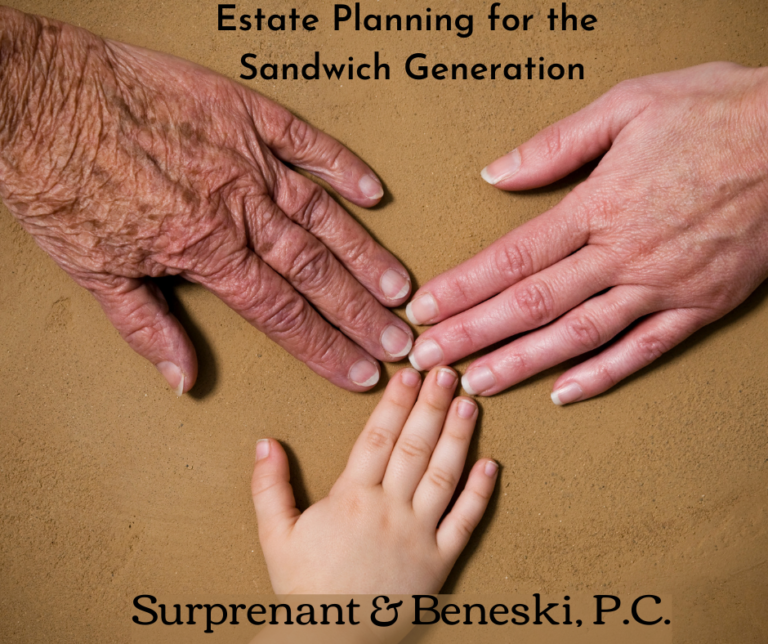Did you know that a staggering 47% of adults in their 40s/50s are providing care to a parent 65 + years old while also raising their own small child or helping to support their young adult child? This increasingly common group has been coined the “sandwich generation” to describe adult children who are sandwiched between caring for their elderly parents and their own children. Needless to say, as rewarding as it may be, it is a very challenging phenomenon.
Being a caregiver for two different age groups is stressful, both emotionally and financially. Statistics indicate that many family caregivers are women who provide approximately 3 hours a day of unpaid care. In addition to caregiving, they also work a full-time job. The emotional toll can be staggering, forcing a caregiver to make choices between attending their child’s soccer game or Mom’s eye appointment. And, of course, the financial toll is not much better. Often times caregivers sacrifice their own savings to help their parents or their young adult children. Caregivers also sacrifice their own careers to take care of others.
All of this leads to stress and to inevitable burnout. Managing stress is the only way, but how? Practice self-care because you can’t be everything to everyone. Know your limits. Remember to exercise, connect with friends. Ask for help from your siblings, other relatives, friends, etc. and accept help graciously. When someone volunteers to help, accept it. They may not do it exactly the way you would do it but that’s okay. Consider hiring home care for your aging parents to provide housekeeping, transportation, companionship, meal prep and assist with other activities of daily living (ADLs). Another option is adult day health care which offers supervision, socialization activities and meals. Maybe your parents need more medical care. You can opt for a medical home health agency that can provide clinical medical supervision through a team of nurses, certified nursing assistants physical/occupational therapists, dieticians, etc. They also offer palliative and hospice services. Another option is respite care at an assisted living community. Respite offers relief and peace of mind if you are going away on vacation or just need a break. Oftentimes, it is a way to see if the senior would prefer to live in a community. For the caretaker child this offers the ability for them to just be a child to their parents again.
But one of the most overlooked professionals to contact is an elder law attorney. An experienced elder law attorney will advise you that in order to help your aging loved one, certain documents must be in place. It is important that they have the following:
- HIPAA Release (Health Insurance Portability and Accountability Act) – HIPAA is a federal law that requires medical personnel and hospitals to protect sensitive patient health information from being disclosed without the patient’s consent or knowledge. Basically, if your loved one does not have a HIPAA Release authorizing you to gain information, the doctors handling their care will not be able to share details of their diagnosis and care or answer your questions.
- Health Care Proxy – Allows you to make medical decisions for your loved one in the case of possible incapacitation. Without this, a court would make a determination of their care.
- Durable Power of Attorney – This document allows you to help your loved one with their financial obligations if unable to. You can speak to their creditors, pay bills, etc. Again, without this document, court action may be required.
- Advance Directive / Living Will – Although not legally binding in Massachusetts, it does help you carry out you loved one’s wishes regarding what efforts they want for medical care and how they want their last days to be. This is basically a blue print for you and your family and relieves you of any guilt because your loved one’s wishes are well documented.
- Last Will and Testament – Obviously this document is for when a loved one passes and outlines how their asset should distributed and to whom.
Estate planning and elder law go beyond just those documents, however. An experienced estate planning attorney can help your family to establish a trust to protect assets, long term care planning, minimize estate tax, probate avoidance, etc. Many times, families receive well-intended but incredibly bad information from friends and other family members. They assume that Mom and Dad will not qualify for things. There is just general confusion of what is an asset, gifting, the look back period and even more. The worst thing to do is, is to do nothing. The sooner that you involve the help of an elder law and estate planning attorney, the better. Not only will it give the peace of mind you and your loved one deserves but it preserves assets for years to come.
Being part of the Sandwich Generation is hard enough. Let us take some things off of your plate for you so you can enjoy the finite time you may have with your loved one instead of worrying.
©Surprenant & Beneski, P.C. 35 Arnold Street, New Bedford, MA 02740, 336 South Street, Hyannis MA 02601 and 45 Bristol Drive, Easton MA 02375. This article is for illustration purposes only. This handout does not constitute legal advice. There is no attorney/client relationship created with Surprenant & Beneski, P.C. by this article. DO NOT make decisions based upon information in this handout. Every family is unique and legal advice can only be given after an individual consultation with an elder law attorney. Any decisions made without proper legal advice may cause significant legal and financial problems.
